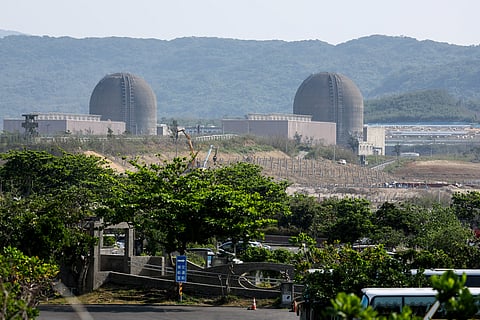
- NEWS
- the EDIT
- COMMENTARY
- BUSINESS
- LIFE
- SHOW
- ACTION
- GLOBAL GOALS
- SNAPS
- DYARYO TIRADA
- MORE

TAIWAN (AFP) — Taiwan will turn off its last nuclear reactor on Saturday, fueling concerns over the self-ruled island’s reliance on imported energy and vulnerability to a Chinese blockade.
The island, which targets net-zero emissions by 2050, depends almost entirely on imported fossil fuel to power its homes, factories and critical semiconductor chip industry.
President Lai Ching-te’s Democratic Progressive Party has long vowed to phase out nuclear power, while the main opposition Kuomintang (KMT) party says continued supply is needed for energy security.
Ma’anshan Nuclear Power Plant in southern Pingtung county is being closed as China intensifies military activity around Taiwan, which Beijing claims as part of its territory and has vowed to bring under its control one day.
During large-scale military drills around Taiwan in April, China simulated strikes on key ports and energy sites as well as blockading the island.
Ma’anshan has operated for 40 years in a region popular with tourists and which is now dotted with wind turbines and solar panels.
More renewable energy is planned at the site, where state-owned Taipower plans to build a solar power station capable of supplying an estimated 15,000 households annually.
But while nuclear only accounted for 4.2 percent of Taiwan’s power supply last year, some fear Ma’anshan’s closure risks an energy crunch.
“Taiwan is such a small place and currently there’s no other better and more efficient natural energy source that can replace nuclear power,” said Ricky Hsiao, 41, who runs a nearby guesthouse.
“The reality is that TSMC and other big companies need a lot of electricity. They would leave Taiwan if it’s not stable,” he told Agence France-Presse (AFP), referring to chipmaking giant Taiwan Semiconductor Manufacturing Company.
But mother-of-two Carey Chen fears an accident like the 2011 Fukushima nuclear meltdown in Japan, which like Taiwan is prone to earthquakes.
“If we can find other stable power sources, I support a nuclear-free homeland for everyone’s safety,” Chen, 40, told AFP.
